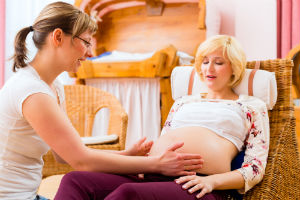Study: Hospital Experience Falls Short of Home Birthing |  |
| Study: Hospital Experience Falls Short of Home Birthing Posted: 28 Sep 2014 08:00 AM PDT  Aside from vaccinations, home birthing is one of the most controversial issues involving pregnancy. In some countries, like Hungary, midwives have been sentenced to prison for helping out with home births. [1] [2] Sadly, though, the same is true in many states of the US where it’s either outright illegal to practice midwifery or, though not officially banned, it’s impossible to get a license. Only 26 of the 50 states allow the practice of midwifery, [3] but there are efforts to change this intrusion into women’s rights. [4]
As sad as this situation is, there’s great news from the scientific front on the safety of home birthing. Reports are now documenting that home births may be as safe or safer than hospital births, hopefully helping change the status of home birth in the 24 states that don’t allow the practice. The reality is that, though there are situations where medical help is required to assure that deliveries are safe for both the mother and baby, that’s the rare exception. Science now supports home deliveries for low-risk births, which are the vast majority of births in the country. Two excellent new studies in the highly-respected journals BMJ and the Cochrane Collaboration demonstrate that, as usual, nature knows best in how new life is brought into the world. Natural home birth with a qualified attendant may actually be safer than hospital delivery. Nationwide StudyThe BMJ published a large nationwide study in the Netherlands that clearly demonstrates that women who opt for home deliveries have much better outcomes than women who choose hospital deliveries. Because home delivery is not a rarity in the Netherlands, but is the choice of nearly two-thirds of pregnant women, this study was able to include a large sampling of planned home births. Women who’d previously given birth had the best results, though even first-time mothers fared a bit better, demonstrating that first-time delivery is not a reason to choose a hospital birth. [5] Review of StudiesOn the topic of home delivery, the Cochrane Collaboration did what it’s famous for: reviewing published research. It looked at several studies and found information for a wide range of birth results, including caesarean section, jaundice, maternal mortality, infant death, resuscitation of the infant, and birth traumas. [6] They found that routine surgical deliveries are a disadvantage to both mothers and infants, and that hospital births routinely utilized a huge array of methods and devices that were simply not required. The bottom line in the medicalization of birth: both mother and baby are treated much like cogs in a machine. If they don’t fit the desired average, that’s too bad–they must be forced into it. In fact, they quote Euro Peristat, a major European report on the health and care of pregnant women and babies as saying, “Concern about the iatrogenic effects of obstetric intervention in women who do not have a clinical need for it has put ‘normal’ birth firmly on the agenda for the 21st century.” Iatrogenic refers to injuries caused by medical procedures. The Science Has Weighed in on Home BirthIsn’t it exciting that science backs up what so many mothers have known for centuries? Outside of rare incidents, birth is a natural process, not something that needs to be managed and depersonalized. Certainly it’s marvelous that doctors and hospitals are there when you need them. However, in most cases, home birthing is a safe, natural way to bring another human being into the world. The truth is that science has never suggested that home deliveries are dangerous, simply because such studies were never done. Bits and pieces have been studied, but until now those bits and piece have never been put together into a single review that tells the truth. Instead of looking at small numbers of births, the BMJ produced a study that looks at an entire nation’s experience with home-planned versus hospital-planned deliveries. Now that studies are being done, the truth is finally coming out. For most women, the safer and far more satisfying choice is natural home delivery, not the medically-controlled model. The latest exciting evidence has just spoken–nature may be best for both baby and mother. Have you experienced a home birth? What were your experiences? Please share with us in the comments! -Dr. Edward F. Group III, DC, ND, DACBN, DCBCN, DABFM References:
The post Study: Hospital Experience Falls Short of Home Birthing appeared first on Natural Health & Organic Living Blog. |
| You are subscribed to email updates from Natural Health & Organic Living Blog To stop receiving these emails, you may unsubscribe now. | Email delivery powered by Google |
| Google Inc., 20 West Kinzie, Chicago IL USA 60610 | |
No comments:
Post a Comment